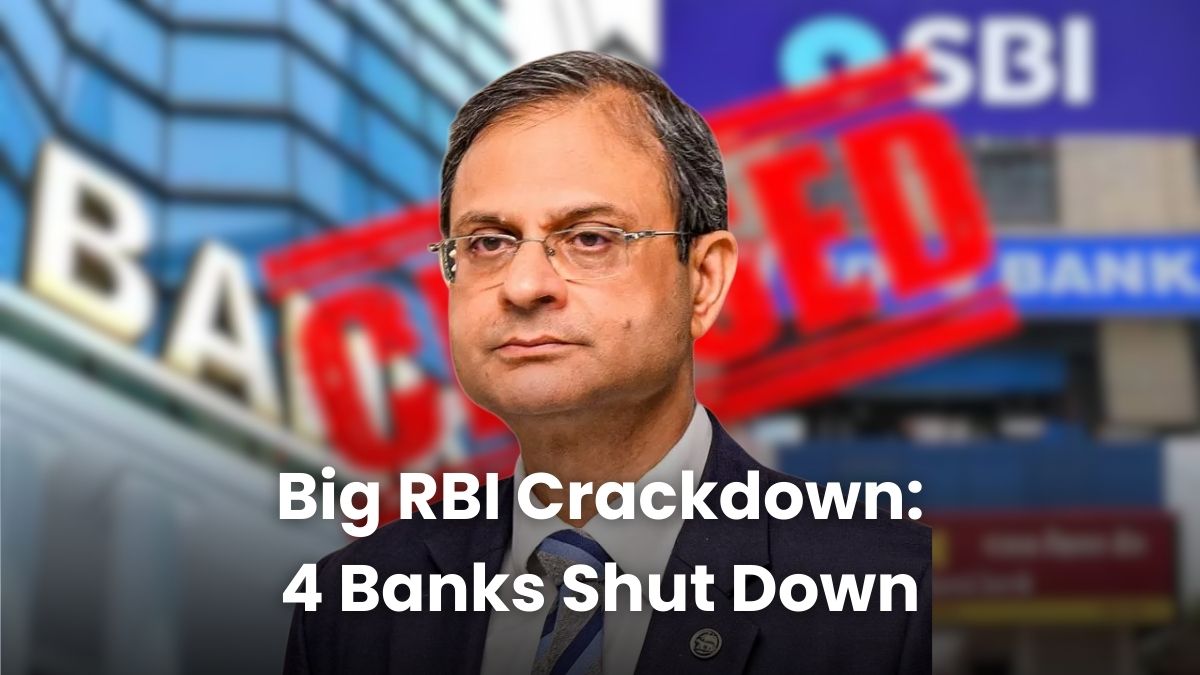RBI Crackdown 2025 – If you’ve got money in a cooperative bank, here’s some important news. The Reserve Bank of India (RBI) has taken a strict step and cancelled the licenses of four cooperative banks. This means these banks can no longer do any banking activities, and all transactions – deposits, withdrawals, everything – are now frozen. So what’s the reason behind this crackdown? What happens to your money now? Don’t worry – here’s a clear and simple breakdown of the whole situation.
Why Did RBI Cancel These Bank Licenses?
RBI is responsible for making sure banks in India follow rules and stay financially strong. When banks start ignoring regulations or get into serious trouble financially, the RBI steps in.
In this case, the four cooperative banks had been violating RBI norms for quite some time. Here’s what went wrong:
- They weren’t following RBI’s directions
- Their financial condition kept getting worse
- They were unable to return people’s deposits
- They didn’t have the minimum capital they needed to operate
- Their internal management was weak and full of risks
Basically, these banks were no longer safe for customers. So, RBI had no choice but to cancel their licenses.
Which Banks Are Affected?
As per reports, these are the four banks whose licenses have been cancelled (Note: These names are examples; for official details, check the RBI website):
- XYZ Cooperative Bank Ltd., Maharashtra
- ABC Urban Co-op Bank Ltd., Gujarat
- Shree Janata Sahakari Bank Ltd., Karnataka
- Sudarshan Co-operative Bank Ltd., Uttar Pradesh
Each of these banks had issues like rising bad loans, poor management, or liquidity problems. And now, they are officially barred from doing business.
What Happens to Your Money?
This is the question on everyone’s mind. The good news is, if you had money in any of these banks, it’s not completely lost.
Thanks to DICGC (Deposit Insurance and Credit Guarantee Corporation), every account holder is insured up to Rs. 5 lakh. This means if your total balance was Rs. 5 lakh or less, you’ll get your money back.
Here’s what you need to know:
- Your money up to Rs. 5 lakh is completely safe
- RBI and DICGC will start the payout process soon
- You don’t need to go to court or take legal action
- Just keep your documents ready (passbook, ID, account proof)
- You’ll be informed about when and how to claim your refund
What Will Happen Next?
After cancelling a bank’s license, RBI follows a clear process to return customers’ money. Here’s the typical timeline:
- RBI announces cancellation – immediate
- Banking activities stop – same day
- A liquidator is appointed – within 2 weeks
- DICGC gets the list of insured customers – within a month
- Refunds start rolling out – within 90 days
- Any leftover dues are settled after liquidation – can take up to a year
So while the process isn’t instant, it’s systematic. You just need to stay patient and informed.
What Should Customers Do Now?
If you’re a customer of any of these four banks, here’s your to-do list:
- Don’t panic – your insured money is safe
- Gather your documents: ID proof, bank passbook, account details
- Keep checking official updates from RBI or DICGC
- Be cautious – ignore calls or messages from unknown sources promising faster refunds
- Don’t take any hasty steps – wait for official instructions
How Will This Affect the Banking Sector?
This crackdown has definitely made people nervous about small cooperative banks. But experts say this move actually shows RBI’s commitment to protecting depositors and improving bank accountability.
Here’s how this could impact the sector:
- Cooperative banks may face more audits and regulations
- People might move their money to bigger or more secure banks
- RBI may encourage weaker banks to merge with stronger ones
- There will likely be more focus on digital compliance and governance
RBI’s Message to the Public
The RBI has made it clear that this decision is about protecting the public’s money and trust in the banking system. It’s not a sign of any major problem in the entire banking sector. In fact, India’s overall banking system is still considered stable and well-capitalized.
So, while this situation is stressful for affected customers, the central bank has taken these steps to prevent bigger problems in the future.
This cancellation reminds us that while banks handle our money, not all banks are equally reliable. It’s always a good idea to keep an eye on your bank’s performance, check for RBI compliance, and diversify your savings if possible.
If you or someone you know has an account in one of the affected banks, make sure they’re aware of the situation and help them follow the correct process to claim their insured money.






